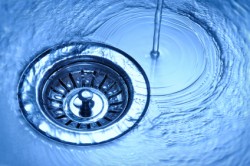When the bathtub starts taking hours to empty, it’s time to think about doing some drain cleaning. Along with the wonderful addition of indoor plumbing to your homes, we must deal with clogged drains. Drain cleaning is a fact of life, messy and disgusting as it can be.
The first step to clearing clogged drains is to prevent them in the first place. You can’t prevent a drain clog forever, but taking steps to reduce incidents of annoying or embarrassing stopped drains are never wasted. Buy a hair trap for shower and bathtub drains. Never pour grease down a kitchen drain. And regular applications of vinegar and baking soda (your own little volcano experiment that does more than wow the crowd at the kids’ science fair) can clear away clogs that are beginning to form.
If a drain has become stopped up, you have several options. The first one people usually turn to is the use of heavy chemicals. Chemical drain cleaners rely on lye or acid to eat through a stubborn ball of hair and toothpaste, grease, or (less effectively) that small toy you didn’t know your toddler flushed down the toilet. These chemical drain cleaners are powerful, but they produce toxic fumes and can pollute our water as well as damage your pipes. It’s better to try other alternatives first, or to use enzyme drain cleaners that eat through stuff but do not do further damage.
Another option is to get out your tools and investigate the pipes. After turning off the water supply (hopefully, forgetting to do that is a mistake you only make once), carefully remove the trap under the sink. A lot of stuff can get stuck in the u-bend that also prevents foul sewer stink from wafting into your home. If you’re lucky and the clog is in the trap, remove the clog and replace the pipe: problem solved. If you can’t find the clog, you can stick a plumbing snake down the pipe and see if you hit anything.
When those two options don’t work and you can’t locate the problem, it’s time to call in the professionals. Your pipes aren’t built for a lot of hard pounding, so instead of having a temper tantrum with the plumbing snake, remember that a licensed plumber will save you the cost of replacing your pipes and the embarrassment of explaining to your significant other why you’ll need a new plumbing system. Certified drain cleaning specialists and licensed plumbers have great tools to deal with clogs, and they also have the experience and knowledge to identify the location of hard-to-find plug-ups.

















